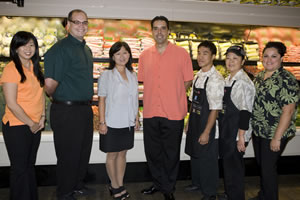School of Grocery
Ross Higa of Leeward Community College created a program to give advance management training to people working in the grocery business, which is supported by local grocers as well as the Western Association of Food Chains, whose members are meeting in Honolulu this week

By .(JavaScript must be enabled to view this email address)
E-mail this story | Print this page | Archive | RSS |
 Del.icio.us
Del.icio.us
|
college or applicable to an associate degree.”
Courses cover microcomputer applications, oral communications, written communications, business math, bookkeeping or accounting, introduction to management, marketing, human resources management, retail management and merchandising, and leadership and human relations.
Both classroom and online instruction are available. The flexibility of traditional face-to-face classroom instruction, as well as via satellite and Internet, enables students to complete the certificate while working part-or full-time.
Additionally, Higa tells us, courses are structured in phases so there are stepping stones to certification. Nothing like having built-in motivation to take learning to the next step.
It is understandable, considering that enrollees are mid-level or upper-level supervisors whose time demands are already stretched. Dealing with their commitment to complete the program is the biggest challenge.
But it’s the nature of vocational training, according to Higa, who joined Leeward Community College in 1986 after a stint as a banker. He realized that his calling was education and molding human capital.
Higa, 52, was born on Oahu but raised on Kauai, where he attended Kauai High School. He has a bachelor’s degree in business administration-finance from the University of Hawaii at Manoa.
“The tie-in with community colleges is to make the certification process accessible and affordable for industry workers,” he says. “At the inception, this program was primarily focused on Oahu, but now it has reached the Neighbor Islands through online instruction, and enrollment has gone through the roof.
“Fortunately, we didn’t have to create any new courses when the program was developed. It was just a matter of packaging what we already had in the management curriculum.”
This has allowed the program to take root and roll out quickly into the community. Among its supporters are major employers such as Foodland, Safeway, Times, and Whole Foods supermarkets.
While competitive in the trade, they are united when it comes to educational opportunities for their workers. The mandate comes from the top, where CEOs such as Steve Burd, chairman of Safeway Inc., and Brad Alford, chairman of Nestle USA - both WAFC convention headliners - heartily endorse the program.

|
George Glukfeld, Safeway Hawaii district manager, underscores the importance of keeping workers motivated and engaged in their jobs. The 24-year veteran of the food business started as a general merchandise clerk, and today oversees a flourishing and growing retail enterprise for the Safeway chain. As a new Hilo store opens this month and construction begins on a new Honolulu store on Beretania Street, there is a steady demand for quality management and supervision in all departments.
“The Retail Management Certification Program clearly adds to an associate’s value to the industry,” says Bob Stout, president of Times Super Market. “Those who complete the program or are pursuing the certificate show great personal initiative. The experience and knowledge gained by the classes are invaluable and definitely enhance one’s chances for promotion.”
There you have it, from someone who has 39 years of experience in the food chain business. Stout started as a “bottle boy” in high school when soda pop bottles were sorted for returns to manufacturers.
Admittedly, a lot has changed from the era of quaint momand-pop grocery stores. Technology has revolutionized nearly every facet of the operations and merchandising of modern stores. Not the least of this is the personalized data mining that goes on when one swipes his or her frequent shopper card at the cashier stand.
But all the electronic wizardry in the world won’t change the intimacy and bond one has with the corner grocery store. Our relationship with merchants who sell life’s essentials - particularly food - is basic to everyday existence.
Let’s face it, many of us see our grocery store clerk more frequently than we see our moms.
Being creatures of habit, we tend to navigate the aisles in a predictable pattern, fuss when inventory is relocated, and favor the same checkout clerk who greets us by name and knows instinctively whether we want paper or plastic bags.
This is known in the business as “high touch.” It’s the “human touch” that overrides sophisticated technology and glitzy marketing. To lack it is the closest path to a “going out of business” sign.

|
Our professor of professionalism, Ross Higa, is a keen observer of local customer service as both an educator and consumer.
“Fifty percent of the classes I teach are customer service-related,” he says. “My observation is that in the general retail landscape, customer service in grocery stores has improved a lot over the years. In fact, it’s great.”
That’s quite a compliment coming from someone who reads customer service like a book. Higa says impressive customer service models are five-star hotels and supermarkets.
If the Retail Management Certification Program is any gauge, WAFC and the community college system can take some credit for that. It’s about “raising all boats” in the name of professionalism, they profess. Now that’s a saleable commodity we can all buy.
Higa’s hope for the retail certification program is that it finds the proper balance for management enlightenment that has both long-term commitment and sustainability.
He also wants it to be a shining light in the community college system that distinguishes itself as an accountable business-education partnership.
It’s said that “real leadership is dreaming bigger for others than they dream for themselves.”
If that’s the bottom line, this educational vision will pay dividends for the future.
Class dismissed.
Page 2 of 2 pages for this story < 1 2
E-mail this story | Print this page | Comments (0) | Archive | RSS
Most Recent Comment(s):








